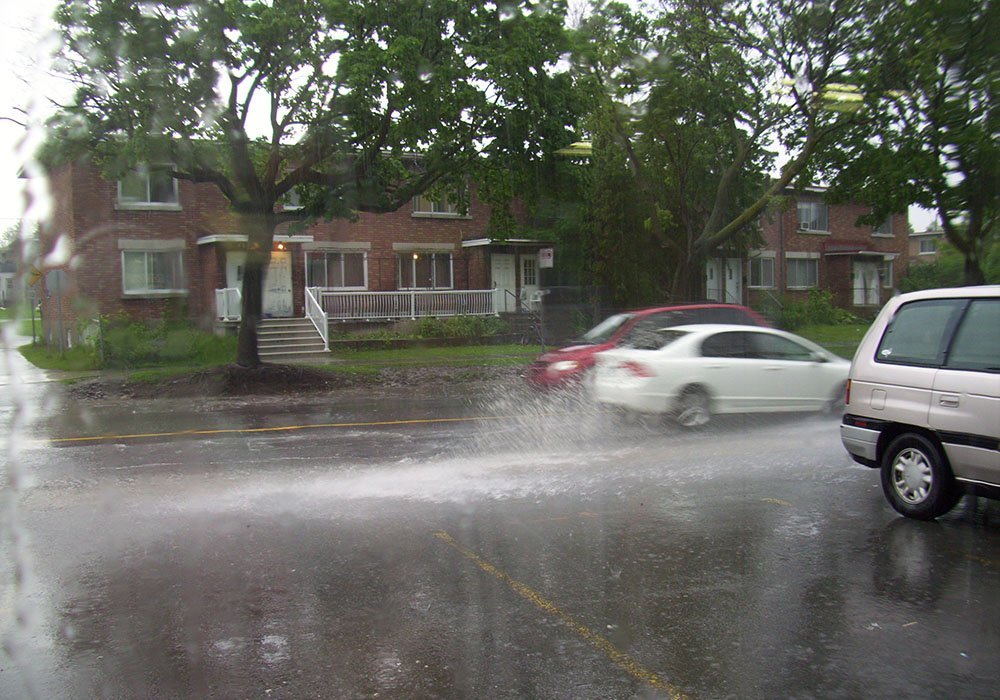Martin C. Barry
Outrage. That’s the only word that comes close to describing one Laval business owner’s feelings of frustration after 17 years of fighting with the City of Laval over a chronic but as yet unresolved flooding and sewer backup problem on Notre Dame Boulevard in Chomedey.
Monster on the loose
“We’re fighting a monster called Ville de Laval,” Jane Moraitis, owner of the Oneiro II boutique, which specializes in formal attire and accessories for baptisms, first communions and confirmations, said in an interview with The Laval News.
“They deprived us of our dream being accomplished, our time with family and friends, suffering great losses, and suffering with health issues caused by immense fatigue and stress?” added Moraitis.
In Greek, the name of her boutique, Oneiro, translates literally as dream. But since buying their building in the late 1990s, the situation has been anything but. “We started out with big dreams of making something exclusive and big, which it is, but this is what we’ve ended up with,” she said.
A year after purchasing the building at 3812-18 Notre-Dame Blvd. in August 1998, they faced the first of a series of floods: it was a huge inundation that destroyed an estimated $27,000 worth of merchandise in the basement, not including lost patterns and plans or time spent cleaning up.

In Greek, Oneiro, means dream, but since buying her building in the late 1990s, Jane Moraitis’s situation has been anything but.
A nightmare grows worse
Her family’s dream of success came to a halt. While the insurance company paid the first $10,000, the city – citing a variety of reasons – refused to pay the balance of $17,000. She took precautions by closing the valves on the floor of the basement and by placing all the boxes of merchandise on bricks.
However, when the city decided to repair and enlarge the street in front of the business about eight years ago, the problem worsened and became a nightmare. Every time there was a heavy rainfall, the street became a river, since the sewers appeared inadequate to do their job properly.
On June 3, 2014, rainwater came in from the front doors of the business. That day, according to Moraitis, she and other members of her family removed 48 huge buckets of water from the basement floor and spent days afterwards cleaning and disinfecting. Then during another large downpour on June 14, water in the basement rose to about a foot, ruining everything that had been placed on the bricks.
The next day, they realized they had close to $14,000 in damages, and this time their insurance would not cover it. And since the problem was recurring, they were now at risk of not being covered anymore. Fed up and tired, they sought a solution by calling a building inspection company, which helped guide them to a foundation specialist.
Expert said sewers blocked
After being told it was not a foundation problem, they consulted a drain specialist. The report from the drain specialist shocked them. According to Moraitis, there was absolutely nothing wrong with their building, but the specialist agreed with the insurance adjuster that since the building has a flat roof, the water from the roof had nowhere to go when the sewers were so badly blocked.
Moraitis maintains there’s pretty much nothing she and her family can do, as the only solution would be to force the city to fix inadequate sewers. She said that when the insurance adjuster visited the surrounding area, the other store owners told him that they also had sewer blockage problems and floods for years, which more recently had become a nightmare.
According to Moraitis, she was told by municipal officials in September 2014 that the city acknowledged the sewer problem and that it would be dealt with within a few years with the help of some government subsidies. But when nothing further was heard, she attended a city council meeting in December 2014 to bring up the issue again. Sparks flew in exchanges between Moraitis and the mayor and the council president.
Waiting for their day in court
Feeling they had no choice but to go to Small Claims Court, on Jan. 29 she and her family asked the court for a postponement of their case. In the meantime, she maintains, the city offered a settlement, $1,000, which she and her family declined.
Moraitis claims that she asked the city that if such huge problems with the sewers on Notre Dame Blvd. existed for so long, how come they gave permits in the area for businesses like a baby and children’s store, a restaurant, a depanneur and an old age home?
In a final ironic twist, Moraitis said that during the first week of June 2015, a sink hole appeared on the surface of Notre Dame Blvd. outside their business. They could see the asphalt rising into the air, under which was a black hole, meters wide and deep, as far as the eye could see. Although the city poured gravel in and patched it up, she wonders: if the street collapses one day, will the city be blamed if somebody gets hurt?



